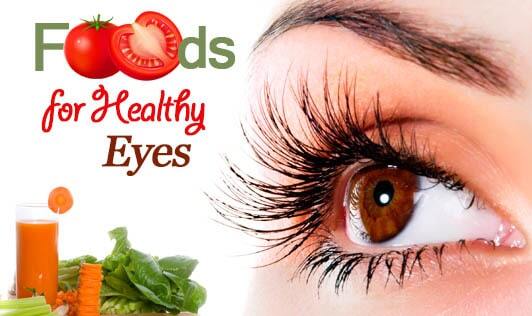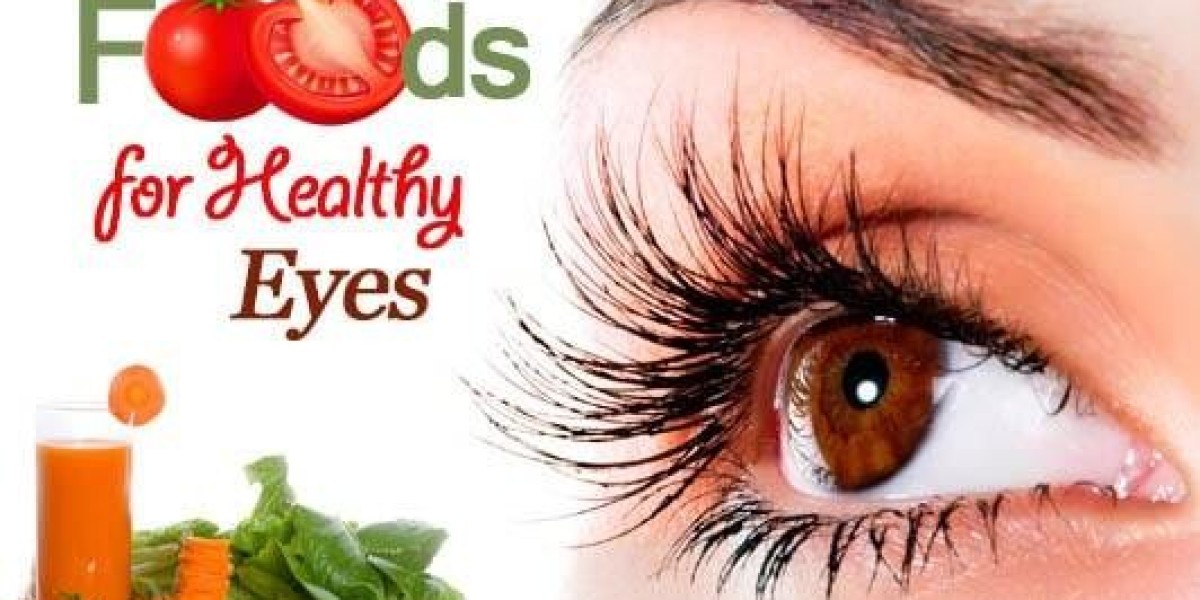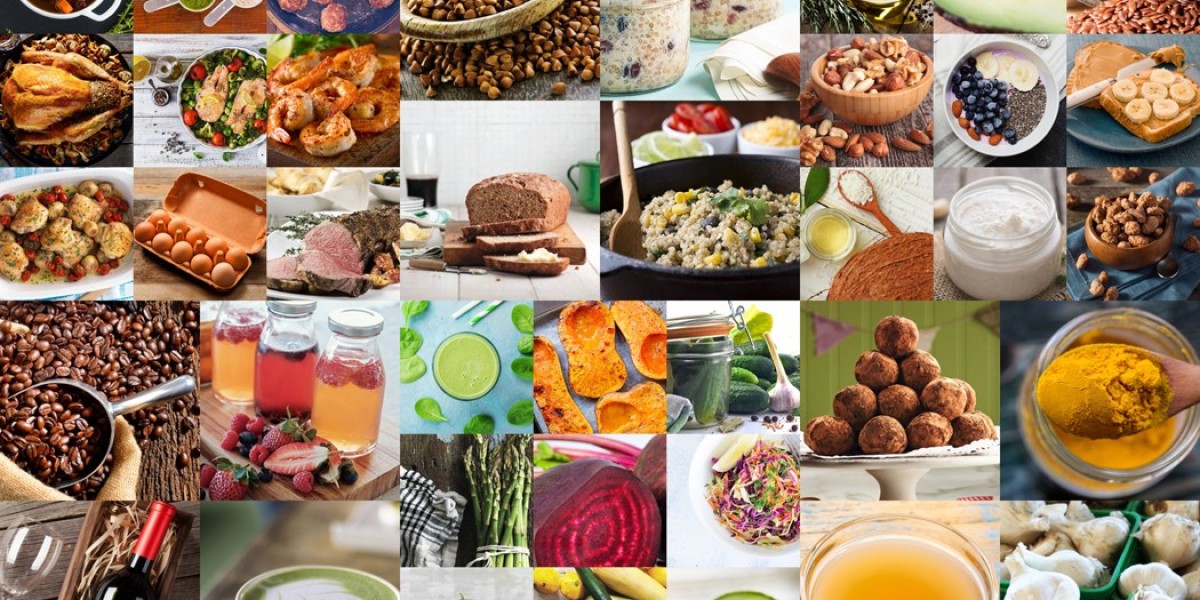Raw red peppers, sunflower seeds, dark leafy greens, salmon, sweet potatoes, lean meat, poultry, beans, legumes, and eggs are foods that improve eyesight. These foods are rich in nutrients like vitamin C, lutein, and zeaxanthin, which can protect the eyes and promote good vision.
Including fruits and vegetables like peaches, red bell peppers, tomatoes, strawberries, kale, spinach, and collard greens in your diet can also contribute to better eye health. Additionally, mangoes, papayas, and bananas are beneficial for the eyes due to their high content of antioxidants and essential nutrients.
By incorporating these foods into your meals, you can naturally improve and maintain your eyesight.
Understanding Vision And Nutrition
Vision is a vital sense that allows us to see and perceive the world around us. To ensure optimal eye health and maintain good vision, it is important to pay attention to proper nutrition. The food we eat plays a significant role in supporting and promoting healthy eyesight. By including certain key nutrients in our diet, we can enhance our vision and protect our eyes from age-related conditions. In this section, we will delve into the link between diet and eye health and explore the essential nutrients that contribute to maintaining good vision.
The Link Between Diet And Eye Health
Research has shown that the foods we consume have a direct impact on the health of our eyes. A well-balanced diet consisting of various nutrients can help prevent eye diseases and support optimal vision. Some key nutrients that are beneficial for eye health include:
Key Nutrients For Maintaining Good Vision
- Vitamin C: Foods rich in vitamin C, such as raw red peppers, peaches, and strawberries, provide antioxidants that can prevent or delay age-related vision problems.
- Lutein and Zeaxanthin: Lutein and zeaxanthin are antioxidants present in fruits and vegetables, particularly yellow and orange varieties and leafy greens like kale and spinach. These nutrients help protect the eyes by absorbing harmful blue light.
- Omega-3 Fatty Acids: Including sources of omega-3 fatty acids, such as salmon and nuts, in your diet can promote good eye health. These healthy fats contribute to the proper functioning of the retina.
- Vitamin A: Vitamin A is essential for maintaining good vision. Foods rich in vitamin A, like sweet potatoes and eggs, support the overall health of the eyes and help prevent night blindness.
- Lean Meat and Poultry: Including lean meats and poultry in your diet provides zinc, an important mineral for eye health. Zinc helps transport vitamin A from the liver to the retina, supporting the production of melanin, a pigment that protects the eyes.
- Beans and Legumes: Beans and legumes like lentils and chickpeas contain a variety of nutrients that support eye health, including zinc and bioflavonoids.
By incorporating these key nutrients into your diet, you can actively contribute to maintaining good vision and promoting eye health. Remember to consult with a healthcare professional or nutritionist for personalized dietary advice based on your specific needs.
Foods That Improve Eyesight Naturally
Improve your eyesight naturally by incorporating foods like raw red peppers, sunflower seeds, dark leafy greens, salmon, and sweet potatoes into your diet. These foods are rich in antioxidants and nutrients like lutein and zeaxanthin, which can help protect your eyes and prevent age-related vision problems.
Additionally, fruits like mango and papaya, as well as bananas, are also beneficial for maintaining healthy eyes.
Examples Of Foods Rich In Eye-beneficial Nutrients
When it comes to maintaining good eyesight, incorporating foods rich in eye-beneficial nutrients into your diet can make a significant difference. By providing essential vitamins, minerals, and antioxidants, these foods support optimal eye health. Here are some examples of foods that are packed with eye-friendly nutrients:
1. Raw Red Peppers
Raw red peppers are excellent sources of vitamin C, an antioxidant that helps protect the eyes from damage caused by free radicals. They also contain vitamin A and beta-carotene, which are essential for healthy vision.
2. Sunflower Seeds And Nuts
Sunflower seeds and nuts, such as almonds and walnuts, are rich in vitamin E, another powerful antioxidant that supports eye health. Vitamin E helps reduce the risk of developing age-related macular degeneration (AMD) and cataracts.
3. Dark, Leafy Greens
Leafy greens like kale, spinach, and collard greens are packed with lutein and zeaxanthin. These antioxidants absorb harmful blue light and protect the retina from damage. Adding these greens to your meals regularly can help preserve your eyesight.
4. Salmon
Salmon is a great source of omega-3 fatty acids, which are essential for maintaining good eye health. These fatty acids help prevent dry eyes and reduce the risk of developing age-related macular degeneration (AMD).
5. Sweet Potatoes
Sweet potatoes are rich in beta-carotene, which the body converts into vitamin A. Vitamin A plays a crucial role in maintaining clear vision, especially in low-light conditions. Adding sweet potatoes to your diet can provide the necessary nutrients for healthy eyes.
6. Beans And Legumes
Beans and legumes are rich in zinc, a mineral that is essential for transporting vitamin A to the retina. This helps support optimal eye health and may reduce the risk of night blindness. Incorporate kidney beans, lentils, and chickpeas into your meals for a nutritious boost.
7. Eggs
Eggs are a versatile source of eye-beneficial nutrients, including lutein, zeaxanthin, vitamins C and E, and zinc. These nutrients work together to protect the eyes from harmful oxidative stress and promote healthy vision. Including these foods in your diet can help improve your eyesight naturally. By nourishing your eyes with the right nutrients, you give them the best chance to stay healthy and function optimally. Remember to consult with your doctor or an eye specialist for personalized advice on maintaining good eye health.
Antioxidants Role In Eye Health
Antioxidants play a crucial role in eye health by protecting the eyes from oxidative stress and age-related damage. Foods like raw red peppers, dark leafy greens, salmon, and eggs are rich in antioxidants like vitamin C, lutein, and zeaxanthin, which can help improve eyesight naturally.
Incorporating these foods into your diet may help maintain and support healthy vision.
How Antioxidants Protect Against Eye Disease
Antioxidants play a crucial role in maintaining and improving eye health. They help protect the eyes from harmful free radicals, which can cause oxidative stress and damage to the cells in the eyes. By neutralizing these free radicals, antioxidants reduce the risk of developing age-related eye diseases such as macular degeneration and cataracts. Antioxidants also support the overall health of the blood vessels in the eyes, promoting good circulation and reducing the risk of conditions like diabetic retinopathy.
Antioxidant-rich Foods For Better Vision
Including antioxidant-rich foods in your diet is essential for maintaining optimal eye health. Here are some examples of foods that are rich in antioxidants and can improve your eyesight:
- Raw Red Peppers: These vibrant peppers are packed with vitamin C, which is a powerful antioxidant that protects the eyes against damage caused by free radicals.
- Sunflower Seeds and Nuts: These crunchy snacks are excellent sources of vitamin E, another potent antioxidant that helps maintain eye health.
- Dark, Leafy Greens: Foods like kale and spinach are abundant in lutein and zeaxanthin, two antioxidants that absorb blue light and help protect the eyes from harmful UV radiation.
- Salmon: This fatty fish is rich in omega-3 fatty acids, which have anti-inflammatory properties and support the overall health of the eyes.
- Sweet Potatoes: Loaded with beta-carotene, sweet potatoes are a great source of vitamin A, which is crucial for good eyesight and night vision.
- Lean Meat and Poultry: These animal-based proteins contain zinc, a mineral that helps transport vitamin A from the liver to the retina, supporting healthy vision.
- Beans and Legumes: These plant-based proteins are packed with zinc and bioflavonoids, which are antioxidants that protect the eyes from oxidative stress.
- Eggs: Eggs are a fantastic source of lutein, zeaxanthin, and vitamin E, making them a nutrient-rich option for maintaining eye health.
By incorporating these antioxidant-rich foods into your diet, you can provide your eyes with the necessary nutrients to maintain their health and prevent the onset of age-related eye diseases. Remember to consult with a healthcare professional before making any significant changes to your diet or if you have specific dietary concerns related to your eyesight.
Vitamins Vital For Vision
Your eyes are an essential part of your body and maintaining good vision is crucial. Luckily, there are several vitamins that play a vital role in improving and preserving eye health. In this section, we will explore the specific vitamins that are essential for vision improvement and the sources you can find them in.
Role Of Specific Vitamins In Eyesight Improvement
Vitamins are organic compounds that your body needs in small amounts to function properly. When it comes to eyesight improvement, certain vitamins have proven to be particularly beneficial. Let's take a closer look at the role of these vitamins:
- Vitamin C: This antioxidant vitamin helps to strengthen blood vessels in the eyes and reduce the risk of cataracts. It also supports the overall health of the eyes and promotes good vision.
- Vitamin E: Another powerful antioxidant, vitamin E, helps to protect the cells in your eyes from damage caused by free radicals. It can reduce the risk of age-related macular degeneration (AMD) and cataracts.
- Vitamin A: Essential for good vision, vitamin A is responsible for maintaining the health of the retina, the part of the eye that processes light. It also helps to prevent night blindness and dry eyes.
- Vitamin D: While primarily known for its role in bone health, vitamin D also plays a crucial role in maintaining healthy eyes. It can reduce the risk of macular degeneration and improve overall visual function.
Sources Of These Vitamins
To ensure you are getting an adequate amount of these vital vitamins for vision improvement, it's important to include foods rich in these nutrients in your diet. Here are some of the best sources for each vitamin:
| Vitamin | Sources |
|---|---|
| Vitamin C | Raw red peppers, strawberries, citrus fruits, kiwi, and broccoli |
| Vitamin E | Almonds, sunflower seeds, spinach, and avocado |
| Vitamin A | Carrots, sweet potatoes, spinach, kale, and apricots |
| Vitamin D | Fatty fish (such as salmon and mackerel), fortified dairy products, and egg yolks |
By incorporating these foods into your diet, you can ensure that you are providing your eyes with the necessary vitamins to support and improve your vision. Remember, a healthy lifestyle and a balanced diet are key to maintaining good eye health.
Minerals And Eye Function Enhancement
Proper nutrition plays a crucial role in maintaining good eyesight. While vitamins are often the focus when discussing eye health, minerals also play a vital role in enhancing eye function. Minerals such as zinc, copper, selenium, and magnesium are essential for maintaining optimal visual health.
Essential Minerals For Visual Health
Below are some essential minerals that are known to support and improve eyesight:
- Zinc: Zinc is an important mineral for overall eye health. It helps transport vitamin A from your liver to your retina, where it is converted into melanin, a protective pigment for the eyes. Zinc deficiency can lead to night blindness or cataract formation.
- Copper: Copper is another vital mineral that plays a role in maintaining good vision. It helps produce melanin, the pigment responsible for eye color, hair color, and skin color. Copper also acts as an antioxidant, protecting the eyes from oxidative stress.
- Selenium: Selenium is a powerful antioxidant that helps protect the eyes against oxidative damage caused by free radicals. It also supports the proper functioning of the immune system, reducing the risk of eye infections and inflammation.
- Magnesium: Magnesium is involved in over 300 biochemical reactions in the body, including those essential for eye health. It helps regulate blood flow to the eyes, maintain healthy intraocular pressure, and prevent the development of glaucoma.
Food Sources High In These Minerals
| Zinc | Beef, lamb, oysters, pumpkin seeds, and sesame seeds |
| Copper | Shellfish, organ meats (liver), sunflower seeds, and cashews |
| Selenium | Brazil nuts, seafood (including tuna, shrimp, and sardines), and sunflower seeds |
| Magnesium | Leafy greens (such as spinach and kale), almonds, cashews, and black beans |
By incorporating these mineral-rich foods into your diet, you can naturally enhance your eye function and promote overall visual health. It's important to note that dietary supplements should only be taken after consulting with a healthcare professional, as excessive intake of minerals can have adverse effects on the body.
Omega-3 Fatty Acids And Eyesight
Omega-3 fatty acids have gained popularity in recent years for their numerous health benefits, including their positive impact on eye health. Research has shown that omega-3 fatty acids play a crucial role in maintaining good eyesight and reducing the risk of various eye conditions. In this section, we will explore the benefits of omega-3 on eye health and highlight some omega-3 rich foods that you can incorporate into your diet.
The Benefits Of Omega-3 On Eye Health
Omega-3 fatty acids are essential fats that our body needs but cannot produce on its own. They offer a wide range of benefits when it comes to maintaining optimal eye health. Here are some of the key benefits of omega-3 on eye health:
- Protecting against age-related macular degeneration (AMD): Omega-3 fatty acids have been found to lower the risk of developing AMD, which is a leading cause of vision loss in older adults.
- Reducing dry eye symptoms: Omega-3s help improve tear production and reduce inflammation in the eyes, which can alleviate the discomfort associated with dry eyes.
- Promoting overall eye health: Omega-3s have anti-inflammatory properties that can help prevent or reduce the progression of various eye conditions, such as glaucoma and diabetic retinopathy.
By incorporating omega-3 fatty acids into your diet, you can support your eye health and reduce the risk of developing vision problems as you age.
Omega-3 Rich Foods To Incorporate Into Your Diet
If you're looking to boost your intake of omega-3 fatty acids, here are some delicious and nutritious foods that you can add to your diet:
- Fatty fish: Salmon, mackerel, and sardines are excellent sources of omega-3s. Aim to include these types of fish in your diet at least twice a week.
- Flaxseeds: These tiny seeds are packed with omega-3s and can be easily incorporated into your meals. Sprinkle ground flaxseeds over your yogurt or add them to your smoothies or baked goods.
- Chia seeds: Just like flaxseeds, chia seeds are high in omega-3 fatty acids. They can be enjoyed in puddings, added to oatmeal, or used as an egg substitute in baking recipes.
- Walnuts: Walnuts are not only a delicious snack but also a great source of omega-3s. Simply grab a handful of walnuts as a healthy snack or add them to your salads or oatmeal.
- Soybeans: Incorporate soybeans or edamame into your meals for a boost of omega-3 fatty acids. They can be steamed and enjoyed as a side dish or added to stir-fries and salads.
By including these omega-3 rich foods in your diet, you can ensure that your body is getting an adequate supply of these essential fats to support your overall eye health.
Colorful Diet For Colorful Vision
A colorful diet is essential for maintaining healthy eyesight. Include foods such as raw red peppers, dark leafy greens, salmon, sweet potatoes, and eggs, which are rich in vitamins and antioxidants that promote good vision naturally. Other beneficial foods include kale, spinach, and fruits like mango and papaya, which contain nutrients like lutein and zeaxanthin, known to protect the eyes from damage.
Incorporating these foods into your daily intake can help improve and maintain your eyesight.
Phytonutrient Compounds And Their Eye Benefits
When it comes to maintaining healthy eyes and improving eyesight, incorporating a colorful diet is essential. By including a variety of fruits and vegetables in your daily meals, you can provide your eyes with the necessary phytonutrient compounds that offer numerous eye benefits.
Phytonutrient compounds are natural plant chemicals that give fruits and vegetables their vibrant colors. These compounds are loaded with antioxidants, vitamins, and minerals that boost eye health and protect against age-related eye diseases. Let's take a closer look at some of the main phytonutrient compounds and their specific eye benefits:
| Phytonutrient Compound | Eye Benefits |
|---|---|
| Lutein and Zeaxanthin | Lutein and zeaxanthin are found in green leafy vegetables like kale and spinach. They help absorb harmful blue light, protect the retina, and reduce the risk of macular degeneration and cataracts. |
| Beta-carotene | Beta-carotene is responsible for the vibrant orange color in fruits and vegetables like carrots and sweet potatoes. It is converted into vitamin A by the body, promoting overall eye health and enhancing night vision. |
| Vitamin C | Foods rich in vitamin C, such as red bell peppers and strawberries, strengthen blood vessels in the eyes and reduce the risk of cataracts. |
| Anthocyanins | This phytonutrient compound gives berries their deep purple and blue hues. Anthocyanins support the production of collagen in the eyes, improve circulation, and protect against retinal damage. |
Incorporating A Variety Of Colors In Your Diet
Now that we know the incredible eye benefits of phytonutrient compounds, let's explore how you can incorporate a variety of colorful foods into your diet:
- Include a mix of dark, leafy greens like kale, spinach, and collard greens in your salads, soups, or smoothies.
- Add colorful fruits like mangoes, papayas, and berries to your breakfast meals or snack on them throughout the day.
- Opt for orange vegetables such as carrots, sweet potatoes, and butternut squash as side dishes or in hearty stews.
- Snack on nuts and seeds like sunflower seeds and almonds for a boost of healthy fats and eye-nourishing nutrients.
- Try incorporating fish like salmon into your weekly meal plan for its omega-3 fatty acids, which support overall eye health.
Remember, the key is to diversify your plate with a rainbow of colors. By doing so, you not only make your meals visually appealing but also provide your eyes with the essential nutrients they need to thrive.
Eye-boosting Superfoods
Eating a well-balanced diet is not just essential for overall well-being but also plays a significant role in maintaining healthy eyes. Including eye-boosting superfoods in your diet can provide your eyes with the necessary nutrients to promote optimal eye health. Let's take a closer look at these superfoods:
A List Of Superfoods That Promote Eye Health
1. Raw Red Peppers: These vibrant peppers are packed with vitamin C, an antioxidant that helps prevent age-related eye problems.
2. Sunflower Seeds and Nuts: These tiny powerhouses are rich in vitamin E, which can help protect the eyes from oxidative stress caused by free radicals.
3. Dark, Leafy Greens: Foods like spinach and kale are abundant in lutein and zeaxanthin, two essential nutrients that can absorb blue light and protect the eyes from damage.
4. Salmon: This fish is a fantastic source of omega-3 fatty acids, which are known for their anti-inflammatory properties and can reduce the risk of dry eyes and other eye conditions.
5. Sweet Potatoes: Packed with beta-carotene, sweet potatoes can be converted into vitamin A in the body, which is essential for good vision and maintaining a healthy retina.
6. Lean Meat and Poultry: These protein-rich foods contain zinc, which can support eye health and play a role in transporting vitamin A from the liver to the retina.
7. Beans and Legumes: High in bioflavonoids and zinc, beans and legumes can help reduce the risk of developing age-related macular degeneration (AMD).
8. Eggs: Egg yolks are a rich source of lutein, zeaxanthin, and zinc, all of which contribute to maintaining healthy eyes and preventing eye diseases.
Benefits Of These Superfoods On Overall Well-being
Incorporating these eye-boosting superfoods into your diet not only improves your eye health but also provides various other benefits for your overall well-being:
- Enhanced immune system due to the presence of antioxidants
- Reduced inflammation throughout the body
- Promotion of healthy skin and hair
- Support for cardiovascular health
- Improved brain function and cognitive abilities
- Prevention of chronic diseases
By regularly consuming these superfoods, you can ensure that your body receives essential nutrients, vitamins, and minerals, allowing you to maintain optimal health and vitality.

Hydration And Its Eye Health Perks
Hydration plays a crucial role in maintaining overall health, and it also has significant benefits for your eyes. Adequate hydration is essential for ocular health, as it affects various aspects of eye function. In this section, we will explore the importance of water for ocular health and how hydration affects eye function.
Importance Of Water For Ocular Health
Water is vital for the proper functioning of our body, and this includes our eyes. The eyes are made up mostly of water, and this fluid is responsible for maintaining their shape and structure. Without sufficient hydration, the tear film, which protects and lubricates the eyes, can become compromised. This can lead to dryness, redness, and discomfort.
Besides maintaining the tear film, water also helps to deliver essential nutrients to the eyes. It allows nutrients to be transported effectively to the various components of the eye, including the cornea, lens, and retina. This ensures that these structures receive adequate nourishment, promoting healthy eye function.
How Hydration Affects Eye Function
Proper hydration is crucial for maintaining optimal eye function. When the body is dehydrated, the efficiency of different ocular processes can be affected. Some ways in which hydration influences eye function include:
- Lens flexibility: The lens of the eye needs to remain flexible to focus on objects at different distances. Dehydration can cause the lens to become stiff and less pliable, which can result in difficulties with near or distance vision.
- Intraocular pressure: Adequate hydration helps to regulate intraocular pressure, which is the pressure inside the eye. When we are dehydrated, there is an increased risk of elevated intraocular pressure, which can lead to conditions like glaucoma.
- Eye fatigue: Dehydration can contribute to eye strain and fatigue. When the body is dehydrated, it can affect blood circulation and oxygen delivery to the eyes, leading to tired, strained eyes.
Therefore, maintaining proper hydration is vital for good eye health and optimal vision. It is recommended to drink an adequate amount of water throughout the day to ensure proper hydration.
Herbs And Spices For Vision Support
When it comes to supporting eye health, it's not just about the foods you eat but also the seasonings you use. Incorporating herbs and spices into your meals can add a burst of flavor while boosting your vision at the same time. These natural seasonings are packed with nutrients and antioxidants that are beneficial for your eyes.
Natural Seasonings That Support Eye Health
1. Turmeric: Known for its anti-inflammatory properties, turmeric contains the active compound curcumin, which may help reduce the risk of age-related eye diseases such as macular degeneration and cataracts.
2. Ginger: A popular spice with many health benefits, ginger is rich in antioxidants that can help protect the eyes against oxidative stress and inflammation.
3. Oregano: This versatile herb is a good source of vitamin A, which is essential for maintaining good vision. It also contains antioxidants that can support eye health.
4. Garlic: Garlic contains sulfur compounds that have been shown to help enhance blood circulation and reduce the risk of eye conditions such as glaucoma and diabetic retinopathy.
Creative Ways To Add These To Meals
Adding these herbs and spices to your meals can be a flavorful way to support your vision. Here are some creative ideas:
| Turmeric: | Ginger: | Oregano: | Garlic: |
|---|---|---|---|
| - Sprinkle turmeric powder on roasted vegetables or use it to season soups and stews. | - Incorporate freshly grated ginger into stir-fries or use it to add a zing to your salad dressings. | - Add oregano to pasta sauces, sprinkle it on pizzas, or mix it into marinades for meat and fish. | - Crush garlic cloves and sauté them with olive oil as a base for various dishes, including vegetable stir-fries and pasta sauces. |
By experimenting with these herbs and spices, you can not only make your meals more delicious but also give your eyes the nutrients they need. So, why not spice up your next meal with these eye-friendly seasonings?
Foods To Avoid For Optimal Eyesight
While certain foods can greatly improve eyesight, it's equally important to be aware of foods that may negatively impact eye health. By avoiding or minimizing the consumption of these foods, you can ensure that your vision remains in optimal condition. Here are some foods to be cautious of:
Foods That May Negatively Impact Eye Health
- Processed foods: Typically high in unhealthy fats and sugars, processed foods can contribute to poor eye health and increase the risk of conditions such as macular degeneration.
- Trans fats: These are commonly found in fried and fast foods, as well as commercially baked goods. Trans fats can cause inflammation and oxidative stress, leading to damage to the blood vessels in the eyes.
- Sugary beverages: Excessive consumption of sugary drinks like sodas and energy drinks can lead to diabetes and obesity, both of which are risk factors for vision problems.
- Excessive alcohol: Heavy alcohol consumption can cause nutritional deficiencies and impair the absorption of essential vitamins and minerals that are important for maintaining healthy eyes.
- Salt: Consuming too much salt can increase the risk of high blood pressure, which can have a negative impact on eye health and increase the likelihood of developing conditions such as glaucoma.
Alternatives For A Vision-friendly Diet
Fortunately, there are plenty of alternative food options that can support a vision-friendly diet and help maintain optimal eye health. Consider incorporating these foods into your daily meals:
- Raw red peppers: Packed with vitamins A and C, raw red peppers provide essential nutrients that promote good vision.
- Dark, leafy greens: Spinach and kale are rich sources of lutein and zeaxanthin, powerful antioxidants that protect the eyes against harmful blue light and reduce the risk of age-related macular degeneration.
- Salmon: High in omega-3 fatty acids, salmon helps fight inflammation and supports overall eye health.
- Sweet potatoes: Loaded with beta-carotene, sweet potatoes are beneficial for maintaining healthy eyes and preventing night blindness.
- Beans and legumes: Packed with zinc and bioflavonoids, beans, and legumes provide essential nutrients that protect the retina and maintain good eye health.
- Eggs: Eggs are a great source of lutein, zeaxanthin, and vitamin E, all of which are crucial for maintaining healthy eyes.
By omitting harmful foods and incorporating these vision-friendly alternatives into your diet, you can take proactive steps toward ensuring long-term eye health. Remember, a well-balanced diet, along with regular eye check-ups and healthy lifestyle habits, is key to maintaining optimal vision.
Safe Cooking Methods To Preserve Vision Nutrients
Preserving the nutrients that improve eyesight can be achieved through safe cooking methods. Opt for raw red peppers, sunflower seeds, dark leafy greens, salmon, sweet potatoes, lean meat, poultry, beans, legumes, and eggs, which are all beneficial for maintaining good vision.
Additionally, greens like kale and spinach contain lutein, which can protect the eyes from blue light.
How Cooking Methods Affect Nutrient Retention
When it comes to improving eyesight, incorporating nutrient-rich foods into your diet is crucial. However, it's essential to understand that the way you cook these foods can significantly impact their nutrient content. Different cooking methods can either preserve or degrade the vision-enhancing nutrients present in these foods. To maximize the eye health benefits of your meals, it's important to be aware of safe cooking methods that help retain these vital nutrients.
Tips To Maximize The Eye Health Benefits Of Foods
1. Steaming
Steaming is a gentle cooking method that helps preserve the essential nutrients in foods. By exposing the ingredients to steam rather than immersing them in water, you can prevent nutrient loss through leaching. Additionally, steaming helps retain the vibrant colors of vegetables, indicating the presence of eye-boosting antioxidants.
2. Sautéing with minimal oil
Sautéing foods with a small amount of oil allows you to preserve their nutrients while adding flavor to your dishes. Use heart-healthy oils like olive oil or avocado oil, which contain beneficial fatty acids and antioxidants. Keep the heat and cooking time moderate to avoid nutrient degradation.
3. Lightly blanching
Blanching involves briefly immersing foods in boiling water and then quickly transferring them to an ice bath to stop the cooking process. This method helps retain the natural colors, textures, and nutrients of vegetables while effectively removing any harmful bacteria.
4. Stir-frying
Stir-frying is a quick and healthy cooking technique that allows you to retain the nutrient content of foods. By cooking ingredients over high heat for a short duration, you can preserve their vibrant colors and essential nutrients. Remember to cut the ingredients into small, even pieces to ensure quick and even cooking.
5. Grilling or roasting
Grilling or roasting foods like fish or lean meat can enhance their flavors and retain their nutritional value. However, be mindful of charred or burnt portions, as they may contain potentially harmful compounds. Aim to grill or roast foods until they are cooked thoroughly but not excessively browned. Incorporating these safe cooking methods into your meal preparation routine can help maximize the eye health benefits of the foods you consume. Remember to choose fresh produce and handle them properly to preserve their nutrients. By making conscious choices in your cooking techniques, you can contribute to optical health maintenance and protect your vision for years to come.
Frequently Asked Questions Of Foods That Improve Eyesight
What Are 5 Foods That Help Improve Vision?
Eating raw red peppers, sunflower seeds and nuts, dark leafy greens, salmon, and sweet potatoes can improve vision. These foods are rich in vitamins and antioxidants that protect the eyes. Other foods like kale and spinach also contain nutrients that benefit eye health.
What Improves Eyesight Naturally?
Certain foods like raw red peppers, sunflower seeds, dark leafy greens, salmon, and eggs can improve eyesight naturally. These foods contain nutrients like vitamin C, lutein, and zeaxanthin that protect the eyes and support healthy vision. Adding kale, spinach, and collard greens to your diet can also benefit eye health.
Regular intake of mangoes, papayas, and bananas can provide antioxidants and essential nutrients that promote good vision and prevent eye conditions.
Which Fruit Is Best For Eyesight?
Mango and papaya are the best fruits for eyesight due to their high levels of lutein and zeaxanthin. These antioxidants protect the eyes from harmful light and support healthy vision. Adding bananas to your diet can also prevent sight loss conditions.
Do Bananas Help Eyesight?
Bananas help improve eyesight by providing essential nutrients that can prevent sight loss conditions like retinitis pigmentosa and macular degeneration. They are rich in vitamins and minerals that are beneficial for eye health, making them a valuable addition to your diet.
Conclusion
Incorporating the right foods into your diet can significantly improve your eyesight. Raw red peppers, sunflower seeds, and dark, leafy greens like kale and spinach are rich in essential nutrients such as lutein and zeaxanthin, which help protect your eyes from harmful blue light.
Additionally, salmon, sweet potatoes, and eggs provide important vitamins and antioxidants that promote good vision. By adding these foods to your meals, you can naturally enhance your eyesight and maintain optimal eye health. Remember, prevention is key when it comes to taking care of your eyes!






